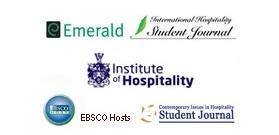The HTMi International Hospitality and Tourism Research Conference managed throughout the years to highlight the love for knowledge and to deliver the fruits of progress in Hospitality and Tourism Research.
Over the two days, the conference brought together leading researchers and industry experts from across Europe, HTMi faculty and HTMi students, to discuss issues facing hospitality and tourism. Contributions were made by participants from over thirty nationalities.
Being an anniversary edition, the 20th Conference addressed a wide area of study related to the Hospitality and Tourism Industry, it explored the effects of major events on local population, witnessed fundamental changes in visitor attractions, observed the behaviour of 5-Star Hotels Guests, and it experienced the increasingly popular experience economy.
On the first day, four presentations were delivered by invited keynote speakers and guest presenters. Dr Catherine Matheson, from the Queen Margaret University of Edinburgh, shared with the audience comcepts related to urban regenerstion and displscement of major events, such as the Olympic Games or the FIFA World Cup. Hosting major events such as the Olympic Games is something being fought over by nations, bringing numerous tourism opportunities, prestige for the hosting nations and regeneration opportunities for its hosting cities, however, many tend to disregard the negative collateral effects that they cause. Effects, such as the displacement of the population, create a paradox whether it’s effect on the city is regenerative or quite the opposite.
Next, Dr Harriet Purkis, from Ulster University, challenged the status quo of visitor attractions. Museums, visitor attractions that are widely known for being static, are now changing the way they are functioning. The transformation is being made through interactive activities for both young and old. Furthermore, the presentation also explored the involvement of local communities in the creation of new opportunities. By raising the stakes and attempting to tackle the realms of education and entertainment, museums and galleries are opening a new age of harnessing knowledge.
Our third speaker, Mr. Sascha Spiegel, F&B Director and hospitality specialist, brought an interesting view on how Vietnamese people choose 5-Star hotels when they travel for non-business purposes to Hanoi, Vietnam. A surprising finding of the on-going research was the importance of prestige when choosing a hotel. Therefore, we are looking forward to see the extended findings of the research, as we believe that it might have significant effects on the industry.
Last, but not least Mr Thijs Glaap, a former student and now a hospitality training manager at HTMi, brought to our attention the trend of the experience economy, a concept which gains more popularity, especially in the hospitality and tourism industry. Mr Glaap contributed to the conference with his study regarding the experience economy implications on the largest walking event in the world, the Dutch Nijmeegse Vierdaagse. His findings confirmed that all realms of the experience economy can be identified in this event.
The remainder of the conference was dedicated to HTMi student presentations, exploring aspects of emotional intelligence, cultural differences, leadership in the hospitality industry among other topics of critical importance. These papers reflected the ongoing quality and diversity of hospitality, leadership, change management, tourism and educational research, which HTMi fosters in order to assist the industry.
Overall, the conference was an inspiring and thought-provoking event and provided many opportunities for discussion and networking among invited guests, HTMi faculty and students. The 21th IHTRCS Conference will take place in November 2018.

